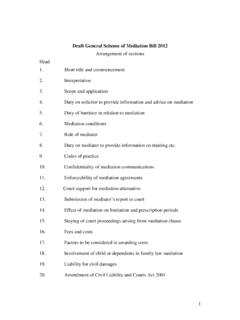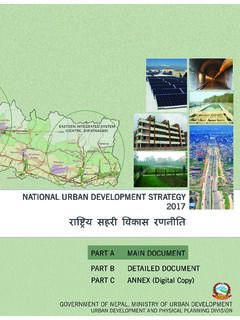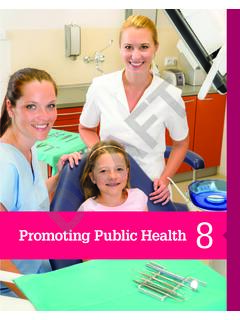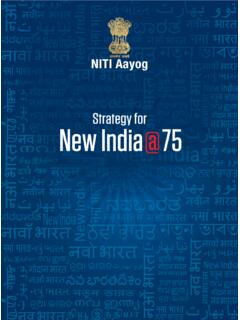Transcription of National Traveller and Roma Inclusion Strategy 2017 – 2021
1 National Traveller and Roma Inclusion Strategy 2017 20211 ContentsForeword by Mr David Stanton , Minister of State with responsibility for Equality, Integration and Immigration 3 Background and Context 9 Development of this Inclusion Strategy 17 Monitoring and Implementation 21 Strategic Themes, High Level Objectives and Actions 23 Cultural Identity 24 Education 25 Employment and The Traveller Economy 27 Children and Youth 30 Health 33 Gender Equality 37 Anti-Discrimination and Equality 39 Accommodation 41 Traveller and Roma Communities 42 Public Services 432 Travellers and Roma are among the most disadvantaged and marginalised people in Ireland. 3to ensure that their concerns are considered when National policy is being developed. It is not a matter of the State deciding what is best for marginalised groups and individuals that approach will not result in meaningful change or improvement in quality of life over the long term.
2 We need to work together in a true partnership where Travellers and Roma groups and individuals work with Government to address the challenges that arise. Such a collaborative and participative approach is necessary so that Travellers and Roma will feel valued and empowered in our society and so that they will feel that they have ownership over, or input into, the decisions which affect their am particularly concerned by the reported rate of mental health problems in both the Traveller and Roma communities. Reliable data has indicated that the suicide rate is almost seven times higher among Traveller males than in the general population. As a society, we cannot stand idly by and allow this situation to continue. In addition, especially as a former teacher, I am concerned by the poor education completion rates of both Traveller and Roma children and youths. Action is needed now, across the public sector, to address these and many other problematic am delighted, in my capacity as Minister of State for Justice with special responsibility for Equality, Immigration and Integration, to present the National Traveller and Roma Inclusion Strategy for the years 2017 2021 inclusive.
3 This Inclusion Strategy is a cross-Departmental initiative to improve the lives of the Traveller and Roma communities in and Roma are among the most disadvantaged and marginalised people in Ireland. During the years of the financial crisis from which Ireland is emerging, those at the margins of our society frequently and regrettably suffered disproportionately from the effects of financial adjustments. Now that Ireland s economy is back on a firmer footing, it is a moral and societal imperative that we work together to address the real needs of these is worth noting, however, that budgetary/economic considerations are not the only factor at play in disadvantage or marginalisation; rather, we need to adopt an approach across Government that considers both the direct and indirect effects of policies on groups and individuals that are socially also firmly believe that we need to adopt a partnership approach with marginalised groups, such as Traveller and Roma organisations, Foreword4 This Inclusion Strategy is the result of painstaking work, participation and cooperation by a wide array of individuals, organisations and Government Departments over the past eighteen months.
4 I am proud to say that it heralds a new era for Traveller and Roma Inclusion in Department held a comprehensive, three phase, public consultation to develop this new Inclusion Strategy . Phase 1 sought to identify the key themes for the new Inclusion Strategy , while the consultations in Phase 2 assisted in the identification and agreement of high level objectives under each of the agreed key themes. While all of the Traveller representative bodies did their utmost to contribute to this process, I would particularly like to pay tribute to Pavee Point who provided valuable administrative assistance in this regard in Phases 1 and 2. Phase 3 of the consultative process was used to identify an array of detailed actions (to achieve each agreed objective) as well as the core Departmental/organisational responsibilities needed for fulfilment of those the key initiatives and developments arising from the development of this Inclusion Strategy are the following:1. State recognition of Travellers as an ethnic group of the Irish nation;2.
5 Investment by the State in community-based support mechanisms to ensure greater retention of Traveller and Roma children and youths in the education system;3. increased funding to be invested by the State to promote knowledge of, and pride in, Traveller culture and heritage;4. in consultation with Traveller representatives, a culturally appropriate initiative will be designed to address feuding in the community;5. a new system of ethnic identifiers will be developed across the public sector to help to track progress and/or challenges for the Traveller and Roma communities in Ireland; and6. reinvigorated efforts by the State to ensure that Travellers and Roma interact fully with the public health sector in order to address some of the underlying health-related challenges facing those to achieve true progress. This may put an additional burden on Government Departments initially but we all need to become accustomed to a new style of thinking and operating so that cooperation and Inclusion become our automatic 30 May 2017, the Government and the National Traveller and Roma Inclusion Steering Group considered, in parallel, the final draft of this Inclusion Strategy .
6 The Government approved the proposed text of this Inclusion Strategy subject to any final adjustments agreed bilaterally with Departments and in the light of the Steering Group s question of recognition of Travellers as an ethnic group in Ireland was considered in depth in the context of the development of this Inclusion Strategy . In September 2015, my predecessor - Aodh n R ord in, the then Minister of State for New Communities, Culture and Equality - brought a paper to the Cabinet Committee on Social Policy and Public Service Reform on the question of recognising Travellers as a distinct ethnic group within Irish society. This followed a process of dialogue with the National level Traveller NGOs during 2015 that culminated in the presentation of an agreed position paper by them and confirmation that there would be no legal or expenditure implications arising from such I would like to thank officials from a range of relevant Government Departments and organisations who gave considerable time and effort to contribute to a meaningful and worthwhile discussion on the development of this Inclusion Strategy .
7 Many of those officials did so despite depleted staffing resources and many other competing priorities. I am proud of our civil and public servants who give generously and wholeheartedly to processes such as this to the finalisation of this Inclusion Strategy was the work of the National Traveller and Roma Inclusion Strategy Steering Group that has members from relevant Government Departments as well as Traveller and Roma representatives and advocates. This Steering Group was formed specifically to work on development of this Inclusion Strategy and then to monitor implementation and progress. I feel strongly that a whole of Government approach is necessary to the achievement of meaningful change and progress for the Traveller and Roma communities in Ireland. Many of the objectives and actions identified during the consultative process cross traditional Departmental and organisational lines and will require close cooperation and ongoing consultation. We need to move away from the traditional model of delineated sectors of activity and move towards one where joined up Government is the Foreword by Minister David Stanton6recognition.
8 The key point is that recognition of the distinct heritage, culture and identity of Travellers and their special place in Irish society would be hugely important to Traveller pride, to Traveller self-esteem and to overcoming the legacy of marginalisation and discrimination that the community has have had a longstanding interest in this area, most notably through my chairing of the Joint Oireachtas Committee on Justice, Defence and Equality when it produced its report on the Recognition of Traveller Ethnicity (April 2014). The rapporteur in that instance was Senator P draig Mac Lochlainn who has continued to do sterling work on this issue. I made a presentation on this issue to the Cabinet Committee on Social Policy and Public Service Reform in December 2016, following which an invitation was extended to Traveller representatives to meet that Cabinet Committee to further those discussions. In what, I think, was an unprecedented step, four Traveller representatives subsequently made a presentation to that Cabinet Committee on 06 February would also note that the current Joint Oireachtas Committee on Justice and Equality, chaired by Deputy Caoimhgh n Caol in, issued a report in early 2017 supporting the recognition of Traveller ethnicity.
9 That report was an important contribution to the is noteworthy that Traveller representatives have been working, over the course of several decades, to attain ethnic recognition 7made by An Taoiseach, this is an important and symbolic gesture that is very important to Travellers but it has no legislative implications, creates no new rights and has no implications for public we move now towards implementation stage of this Inclusion Strategy , I would like to point out that this Inclusion Strategy should be regarded by all as a living document which will be subject to regular monitoring as well as amendment (where appropriate), particularly in the light of the outcome of a mid-term review planned for early look forward to continuing to work with the Traveller and Roma communities in Ireland and to achieving tangible improvements in their lives as important parts of Irish David Stanton TDMinister of State for Justice at the Department of Justice and Equality with special responsibility for Equality, Immigration, and IntegrationJune 2017for their community in Ireland.
10 On behalf of the Government, I would like to thank those advocates for their tireless efforts and persistence in pursuing their am delighted that, on 01 March 2017, An Taoiseach, supported by representatives of all parties, made a statement in D il ireann to announce Ireland s recognition of Travellers as a distinct ethnic group in Irish society. This was a momentous and unprecedented decision in our country s history and is one of which we should be justifiably proud. By taking this step, Ireland has shown its determination to value the unique culture, identity and heritage of Travellers in this of the distinct heritage, culture and identity of Travellers and their special place in Irish society will be hugely and symbolically important to their pride and self-esteem and overcoming the legacy of economic marginalisation, discrimination and low self-esteem with which the Traveller community has struggled. This is not to ignore the real problems that the Traveller community faces but such a symbolic gesture will create a new platform for positive engagement by the Traveller community and the Government in together seeking sustainable solutions based on respect and an honest dialogue on these issues and challenges.






